Can Australian PM fight opposition surge?
- Published
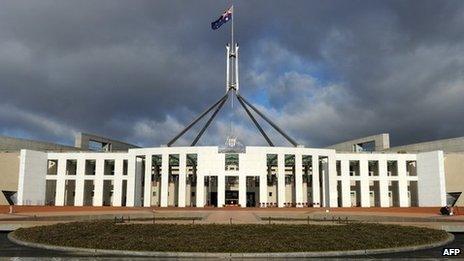
Australian conservatives are seeking a return to Canberra
A blue wave is slowly spreading across Australia as rejuvenated conservatives seek a grand slam of victories in the nation's political jurisdictions.
Last month the once-mighty Labor Party suffered its worst-ever defeat in the Queensland state election.
The rout left the party traumatised and its vanquished leader Anna Bligh with barely enough MPs to fill a camper van.
It followed a humiliating defeat inflicted by the centre-right Liberal Party in New South Wales in March 2011.
National elections are due next year and many commentators are predicting a drubbing for the ruling party.
Federal Labor backbencher Shayne Neumann, who holds the seat of Blair, west of Queensland state capital Brisbane, by less than 5%, remained bullish about his party's chances.
"We'll bounce back," he insisted. "I'm not engaging in some sort of wrist-slashing."
In public Labor heavyweights share that confidence, insisting that the disaster in the Sunshine Coast was down to corrosion within the local branch, and not dissatisfaction with the leadership of embattled Prime Minister Julia Gillard.
Privately though, some MPs in Canberra fear the party is heading towards a titanic loss in 2013, feelings of doom reinforced by a recent opinion poll that showed support for the Gillard government had fallen to near-record lows.
"Remember Anna Bligh had made promises about not selling off state assets and then sold (them) off very promptly," explained independent federal MP Andrew Wilkie.
"I think people lost trust in her, they then stopped listening. The (Labor) brand was tarnished and I think this is exactly what we have at the federal level."
"I think federally, the ALP (Australian Labor Party) is in for a terrible election result," Mr Wilkie said.
'Cataclysmic' defeats
When Kevin Rudd became prime minister almost five years ago, Labor seemed unstoppable. It held office federally and in every territory and state. How quickly things can turn sour.
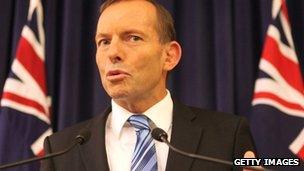
Tony Abbott says the carbon tax has played a key role in swaying voters
The conservatives now also control Victoria, the country's second most populous state, and resource-rich Western Australia.
Labor is widely predicted to lose its hold on the Northern Territory in August's election, while the centre-left party's authority over the Australian Capital Territory could weaken when it heads to the polls in October.
Judgement of Labor administrations in South Australia and the island state of Tasmania will come in early 2014 but the conservatives could snare the biggest prize within a year at a federal election.
Spearheading a unyielding assault on the minority Labor government is Tony Abbott, the pugnacious leader of a coalition of the Liberal and National parties.
For months, he has repeatedly savaged a key economic and environmental reform championed by Julia Gillard - the carbon tax.
It will force some of Australia's biggest polluters to pay for each tonne of carbon dioxide they emit.
Naysayers insist it will wreak untold damage on Australia's coal-dependent economy, while its supporters argue the tax will cut emissions and herald a renewable energy revolution.
Mr Abbott, a former seminarian, says voters in recent state elections have delivered their verdicts on the controversial levy.
"We've now seen two cataclysmic results for the Labor Party and the carbon tax was a factor in both of them," he said.
Tough at the top
But in Australia's political beauty contest, mid-term unpopularity is not always terminal.
Professor John Wanna from the Australian National University says the country's last conservative prime minister proved that Lazarus-type recoveries are possible.
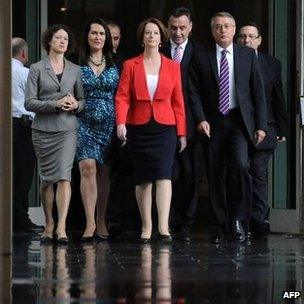
Julia Gillard says she believes the national election will be fought on its own issues
"John Howard was quite unpopular around 2000 after the introduction of the GST (Goods and Services Tax) but managed to win in 2001, so it is not irreversible," Prof Wanna told the BBC.
"Having said that the kind of policy problems that Gillard has got herself into look like they are impossible to resolve."
"It is widespread among middle-of-the-road voters that Julia Gillard deceived electors by saying (before the last election) she wouldn't introduce the carbon tax," he added.
Despite the daily grind of opposition attacks and negative headlines, Australia's Welsh-born leader has shown the pressure has not become overwhelming.
Acknowledging the scale of the Queensland defeat, she said that the national election would be fought "on its own issues". People would make their decisions then, she said.
And she recently thrilled a fund-raising audience with details of a light-hearted exchange with the US president.
"'I'm good mates with Barack Obama,'' she reportedly told the gathering in Sydney.
"I tell him: 'You think it's tough being African-American? Try being me… try being an atheist, childless, single woman as prime minister.'"
- Published27 February 2012
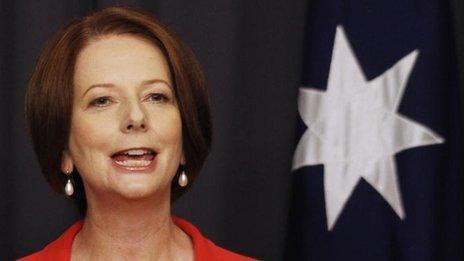
- Published27 February 2012
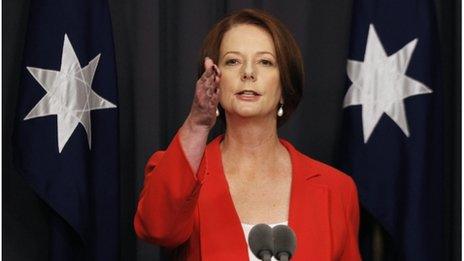
- Published7 January 2020